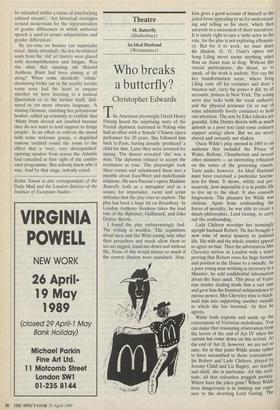Theatre
M. Butterfly (Shaftesbury) An Ideal Husband (Westminster)
Who breaks a butterfly?
Christopher Edwards
The American playwright David Henry Hwang heard the surprising story of the French diplomat stationed in Peking who had an affair with a 'female' Chinese opera performer for 20 years. She followed him back to Paris, having already 'produced' a child for him. Later they were arrested for spying. The dancer revealed 'she' was a man. The diplomat refused to accept the revelation as true. The playwright took these events and refashioned them into a parable about East/West and male/female relations. He uses Puccini's opera Madame Butterfly both as a metaphor and as a source for imperialist, racist and sexist attitudes that the play tries to explore. The play has been a huge hit on Broadway. In London Anthony Hopkins takes the lead role of the diplomat, Gallimard, and John Dexter directs.
I found the play embarrassingly bad. The writing is wooden. The arguments about men and the West seeing only what their prejudices and needs allow them to see are ragged, hand-me-down and without life. None of this would matter so much if the central illusion were sustained. Hop- kins gives a good account of himself as the jailed lover appealing to us for understand- ing and telling us his story, which then unravels in a succession of short narratives. It is surely right to cast a virile actor in the role, for the play is not exploring effemina- cy. But for it to work, we must share his illusion. G. G. Goei's opera star Song Liling never seems anything other than an Asian man in drag. Without this crucial ambivalence, the thrust, so to speak, of the work is undone. Nor can the key transformation scene, where Song Liling casts off his costumes and dons a business suit, carry the power it did, by all accounts, possess in New York. The young actor also lacks both the vocal authority and the physical presence (in or out of some admittedly lovely costumes) to hold our attention. The sets by Eiko Ishioka are graceful. John Dexter directs with as much aplomb as a poor text (and some ordinarY support acting) allow. But we are never stirred and certainly not shaken.
Oscar Wilde's play opened in 1895 to an audience that included the Prince of Wales, Balfour, Chamberlain and several other ministers — an interesting reflection on the tastes of the governing classes. Taste aside, however, An Ideal Husband must have exercised a particular fascina- tion for them. It shows, wittily and per- suasively, how impossible it is in public life to live up to the ideal. It also counsels forgiveness. The pleasure for Wilde was obvious. Apart from confounding the forces of morality, he was able to create a dandy-philosopher, Lord Goring, to carry out the confounding.
Lady Chiltern worships her seemingly upright husband Robert. He has brought a new tone of moral honesty to political life. His wife and the whole country appear to agree on that. Then the adventuress Mrs Cheveley arrives in London with a letter proving that Robert owes his huge fortune and position in the House to a swindle. As a poor young man working as secretary to a Minister, he sold confidential information about the Suez canal. This piece of Victo- rian insider dealing made him a vast sum and gave him the financial independence to pursue power. Mrs Cheveley tries to black- mail him into supporting another swindle in which she has invested. At first he agrees.
Wilde both exploits and sends up the conventions of Victorian melodrama. You can make that reassuring observation from the haven of the end of Act IV when the curtain has come down on this revival. At the end of Act II, however, we are not so sure, for at that point Wilde seems rather to have succumbed to those conventions. Sir Robert and Lady Chiltern, played by Jeremy Child and Liz Bagley, are starchy and shrill, she in particular. All this recti- tude, all that colourless priggish probity. Where have the jokes gone? Where Wilde lives dangerously is in limiting our expo- sure to the diverting Lord Goring. The
play is not well known. The audience were clearly waiting for a stream of witticisms a la Importance of Being Earnest, and they weren't getting it. Or only in small doses, in the form of Lady Markby. Moira Red- mond plays this old trout with camp abandon — swooping and whooping about the register, eyes rolling in mock horror and perplexity at the modern world. Wilde gives her some excellent lines, and Miss Redmond's pantomime turn just about keeps the first half afloat.
Act III is set in Lord Goring's library, where he is visited by Mrs Cheveley. Artifice rules at last. The wit flows, the melodrama is deployed and the plot clever- ly unravelled. It is a delight to watch. Jeremy Sinden's style has touches of Simon Callow here, touches of Rowan Atkinson there. But he has made the part memor- ably his own. Lord Goring is corpulent and affected, lazy but wise. His epigrams are the most polished in London, his but- tonhole the most consciously 'trivial'. Does this portrait remind you of anyone you know? One or other of these attributes earns him the affections of the pretty Miss Mabel Chiltern (Emma Watson in a per- formance that is too high on mannerism). Although their arrival is slightly delayed, the virtues of style, tolerance and comic spirit prevail in this enjoyable production.



















































 Previous page
Previous page